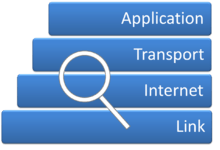Internet Protocol Analysis

Internet protocol analysis is an advanced computer networking topic that uses a packet analyzer to capture, view, and understand Internet protocols. This course is comprised of 15 lessons that use Wireshark to study and experiment with Internet protocols. Each lesson includes Wikipedia readings, YouTube videos, and hands-on learning activities.
Preparation
This is a third-semester, college-level course. Learners should already be familiar with introductory computer networking concepts.
Lessons
- Introduction
- Packet Analyzers
- Link Layer
- Address Resolution Protocol (ARP)
- Internet Layer / IPv4
- Subnetting
- IPv6
- Internet Control Message Protocol (ICMP)
- Multicast
- Transport Layer
- Address Assignment
- Name Resolution
- Application Layer
- Routing
- Network Monitoring
References
- Carrell, Jeffrey L., Chappell, Laura & Tittel, Ed (2013). Guide to TCP/IP, Fourth Edition. Cengage. ISBN 9781133019862
- Chappell, Laura A. & Tittel, Ed (2007). Guide to TCP/IP, Third Edition. Course Technology. ISBN 9781418837556
- Davies, Joseph (2012). Understanding IPv6, 3rd Edition. Microsoft Press. ISBN 9780735659148
- Fall, Kevin R. & Stevens, W. Richard (2012). TCP/IP Illustrated, Volume 1: The Protocols, Second Edition. Pearson. ISBN 9780321336316
This article is issued from Wikiversity - version of the Friday, August 21, 2015. The text is available under the Creative Commons Attribution/Share Alike but additional terms may apply for the media files.